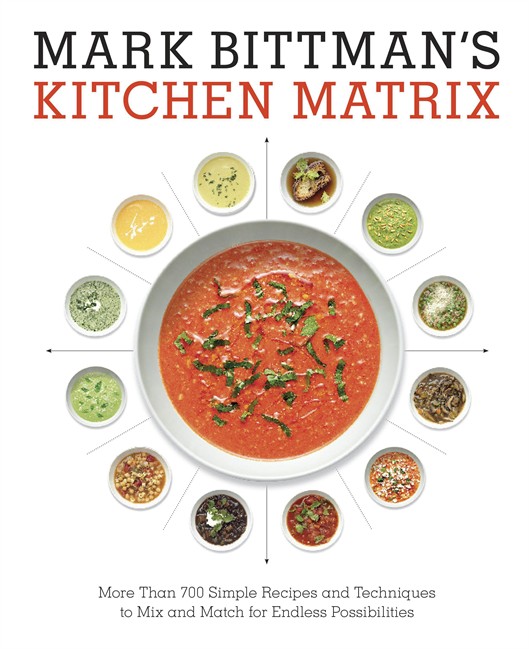Mark Bittman has an exponential theory of cooking: If you can cook one dish, you can cook thousands.

And his latest cookbook, Kitchen Matrix, aims to help home cooks unlock that potential. But he does it minus much of the usual cookbook fodder. You won’t find chatty anecdotes or painstaking instructions spelling out every twist and turn of a recipe. You will get multiple and inventive riffs on single ingredients, as well as classic techniques presented as mix-and-match grids.
Looking for Buffalo wings? They’re here, but in the form of a master recipe for marinated and grilled wings followed by a dozen variations ranging from Korean-style to chipotle-lime. Other dishes get the “recipe generator” treatment. For instance, a page on stuffed grape leaves lays out techniques for dealing with the leaves, then lists the fillings, grains and seasonings for assembling as the reader sees fit.
Which is to say the beautifully photographed and designed book — which comes out in October — embraces a bold, fresh way to share recipes.
Bittman, whose previous books include the comprehensive How to Cook Everything, developed his matrix-style recipes during his five-year stint writing an opinion column on food for The New York Times Magazine. The column gave him space to tackle food as it moved him, sometimes writing about issues such as soda taxes, sometimes devising new recipes.

Get breaking National news
He recently announced he is stepping away from that gig to take a central role at a San Francisco Bay area start-up where his new job involves making it “easier for people to eat more plants,” he wrote in his farewell column on Sept. 12.
Though the matrix is relatively new, Bittman points out that the essential approach — learn a technique, then translate that to other ingredients — dates back to his first cookbook, Fish.
“I’ve always had this philosophy that if you could cook one dish you could cook 10, and if you could cook 10 you could cook 10,000, because everything spins off everything else,” he said in a recent telephone interview.
The magazine column configuration changed about a year ago, bringing the matrix entries to an end; but the best are preserved in the book, redesigned for the new format, along with other recipes.
“I think it’s the most beautiful book. I’m really excited about it,” Bittman said.
Another thing Bittman’s excited about: the abundance of fresh produce and locally farmed meat in Berkeley, his home since the beginning of this year. He gets asked a lot which is better, East Coast or West Coast food “and I don’t want to be a jerk, but the food is twice as good here, we know that,” he said.
In fairness, he does give the East Coast points for its fish scene, but “on the East Coast cooking is harder because you have to juggle way less than ideal ingredients for six or eight months of the year, whereas here as long as you’re willing to go with the seasons something great is always in season.”
There are hundreds of recipes in the book, everything from vegan entrees to surf and turf to 20 takes on Thanksgiving leftovers (that includes a tasty-sounding eggs baked in stuffing). Perhaps most impressive: Celery, 16 ways — think slaw, salsa, noodles, soup — an overlooked vegetable that, he points out, is “cheap — use lots.”
Straying from the conventional path carries a risk. Bittman noted that his 2009 cookbook, Kitchen Express, was built around variations on recipes written in short paragraph form. While it worked well for experienced cooks looking for new ideas, the format seemed to intimidate beginners. But based on his experience with readers at the magazine, he’s hoping to connect with Kitchen Matrix.

Comments